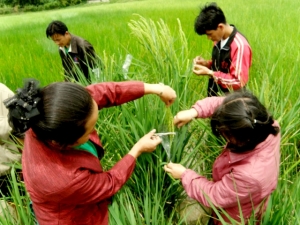SAEDA, the Sustainable Agriculture & Environment Development Association (formerly SAF, the Sustainable Agriculture Forum) is a non-profit civil society organization founded in March 1991 in Lao PDR. SAEDA is currently obtaining official registration as a non-profit organization.
SAEDA works to support vulnerable communities by promoting sustainable agriculture practices, and improving their capacity and awareness to safeguard the environment with projects focusing on three main areas of intervention: Sustainable agriculture, Chemical Pesticide Risk Reduction and Biodiversity Conservation.
The Need to Support 80% of total population in Lao PDR relies on agriculture for income, close to 50% suffer from chronic malnutrition and 70% resides in rural areas with poor access to training and information. Low productivity, high input, biodiversity decreasing, low nutrition and environmental degradation are all common problems due to the low knowledge and skills about possible alternatives and best-practice techniques.
VISION
We envision a future for Lao communities with sustainable improved livelihood in food security and nutrition based on environmentally sound agricultural development.
MISSION
We promote sustainable agriculture and environmental conservation through capacity development an income generation by using participatory approaches – empowering our poor communities composes on farmers, women, youth and ethnic groups.
OBJECTIVES
1. Support Lao PDR to attain its Millennium Development Goals (MDG’s) and implement it’s National Socio-Economic Development Plan & National Growth Poverty Eradication Strategy
2. Spread good practices on sustainable agriculture practices and share the appropriate technologies to improve productivity, health and income.
3. Develop the capacity of farmers, government, and extension workers on local, national and international level using participatory approaches
4. Support Farmer to Farmer Extension, farmer organization and linkages to network and fair markets.
5. Increase skills and access to appropriate tools and information.
